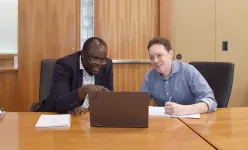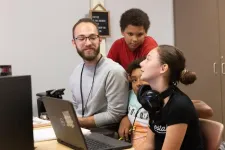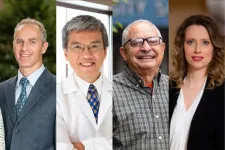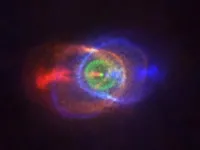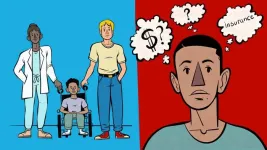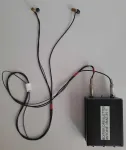(Press-News.org) In the Making Sense of Science series – launched today (20 November) by Frontiers’ Policy Labs in partnership with the International Science Council (ISC) – world leading scientists, including scientific experts and knowledge brokers from the ISC Fellowship, give insights into how science should be understood by the public and applied to policies that affect societies worldwide.
In the face of global threats – health crises, climate change, war – we need political will, global collaboration, inter- and transdisciplinary approaches, systems thinking and scientific breakthroughs at a scale not yet seen. On all those counts, success will depend heavily on the widespread sharing and uptake of the latest scientific knowledge, but also on a novel approach to designing science, through co-design that reflects the aspirations and expectations of multiple stakeholders other than scientists themselves – society in short. In this regard, public trust in scientific knowledge is key.
In the Making Sense of Science series contributors bring their perspectives to what science is, and how it can contribute to finding solutions to large scale societal challenges. In a diverse collection, articles range from exploring how we make sense of science in an age of AI to how sense-making is nuanced and can incorporate diverse forms of knowledge and insight. The series aims to develop dialogue and explore different perspectives on the role of science in providing foresight for decision-making. The contributions also examine the risk of science and certainty in policy-making at different scales and in different contexts, and what we can learn, un-learn and e-learn about meaningful and impactful science engagement.
Commenting on the series, Dr Salvatore Aricò CEO, International Science Council, said:
“This new partnership between the International Science Council and Frontiers aims to build public understanding of science and its societal value in shaping informed policies for a sustainable future. Through this series of opinion pieces, we invite diverse voices to engage in meaningful dialogue, bridging gaps between scientific knowledge and societal needs, and ultimately ensuring that science serves as a cornerstone for effective decision-making in the 21st century.”
Co-editor of the Making Sense of Science series and Policy Labs editorial board member, Professor Ruth Morgan, added:
“Science and scientists have an important role to play as we lay foundations that will direct the course of the future. This collection explores some of the intersections, synergies, and tensions of science and its applications in society, and creates an opportunity to question, imagine, and come together to shape a future that serves societies and our planet. It is our hope that this series of commentaries on the critical issues of sense-making and trust in science fosters an ongoing dialogue and raises new questions that will move us forward.”
Professor Jean-Claude Burgelman, Chief Editor, Frontiers Policy Labs, underlined the importance of science and policy working together:
"Making Sense of Science, and science policy exemplifies the Policy Labs mission: working with preeminent and committed partners, such as the International Science Council, to draw together diverse and provocative opinions on the critical interplay between science and policy for public good. I hope readers are as challenged and inspired by these insights as we at Policy Labs have been in producing them. "
Below are some highlighted quotes from the wide-ranging, incisive, and challenging contributions in the series:
“A critical issue is that much of the research conducted in developing countries still follows a model that prioritises academic metrics over societal impact.”
‘Rebuilding Trust and Embracing Diverse Knowledge Systems: A perspective from Developing Countries’ by Dr Yousuf Al Bulushi, CEO AWJ Innovation, Oman; Associate Deputy Rector for Innovation and Educational Services GUtech, Oman, Fellow of the International Science Council
“By analogy, we could imagine a kind of ‘scientific evidence liability,’ not with a view to establishing a legal framework, but to encourage the providers of ‘scientific evidence,’ i.e. scientists, to establish a relationship of trust with their users, e.g. ‘policymakers.’ To put this idea into practice, as a first step, we can define, through an open and humble dialogue between ‘scientists’ and ‘policymakers,’ a list of principles to be respected in order to use ‘scientific evidence’ in policy making with precaution.”
‘Making sense of science in the 21st century – A personal view’ by Professor Emeritus Yuko Harayama, Tohoku University, Japan; Secretary General, GPAI Tokyo Expert Support Centre, Japan, Fellow of the International Science Council
“As the International Science Council (ISC) says, it is time to flip the science model. To put it upside down by mobilising massive capacities at the service of people and the planet. Science has shown that a balance between human wellbeing and planetary health is achievable, and that equity is the cornerstone of that balance.”
‘Science for a Second Chance on Earth?’ by Carlos Alvarez Pereira, Secretary General, The Club of Rome
“The ISC and the International Network for Government Science Advice (INGSA) have proposed redefining the role of the scientist to include ‘knowledge synthesizers,’ ‘knowledge brokers,’ and ‘knowledge communicators’ alongside traditional ‘knowledge generators.’ This inspiring proposal must be openly discussed and embraced by society and the scientific community.”
‘What is science and who is a scientist in the 21st Century?’ by Professor Tateo Arimoto, Executive Research Fellow of Economic and Social Research Institute at the Cabinet Office, Japan; Director of Research Institute of S&T for Society at JST, Japan, Fellow of the International Science Council
“[I]ncreasing specialization in science creates barriers to inclusivity and understanding, particularly in policy and decision-making. Breakthroughs in artificial intelligence, genomics, and climate science exacerbates this issue, as compartmentalization makes it harder for non-experts to grasp these advances.”
‘Science is a way of thinking much more than it is a body of knowledge’ by Professor Huadong Guo, Director-General of the International Research Centre of Big Data for Sustainable Development Goals (CBAS), China; Professor of the Chinese Academy of Sciences (CAS) Aerospace Information Research Institute, Fellow of the International Science Council
“Developing the foundation to strengthen trust in science in today's young generation will build the basis of decision-making for the very same generation when they have risen to hold critical stakeholder positions.”
‘Trusting in Science? But for how long?’ by Cyrus Walther, CODATA Executive Committee Member; IUPAP Vice-Chair Physics and Industry, Geneva; Fellow of the International Science Council
“Questions today about ‘trust in science’ or ‘making sense of science’ are an outcome of policies created for momentary political effect without forward-looking implementation, as happens with uninformed decisions, like walking out of the World Health Organization in the middle of a pandemic.”
‘Inclusion and Common-Interest Building with Science for Sustainability’ by Professor Paul Arthur Berkman, Head of the Arctic Ocean Geopolitics Programme at the Scott Polar Research Institute, University of Cambridge, UK; Research Professor at the Bren School of Environmental Science and Management at the University of California, Santa Barbara, USA, Fellow of the International Science Council
“I am constantly surprised that there is not more unease about how relying on AI, a glorified form of look-up table, can sidestep the need for understanding, the kind that can give the public real insights into how the world works. The foundations of public engagement rest on providing a mechanistic view and yet the rise of AI erects a barrier to understanding of science.”
‘The more AI, the less understanding?’ by Roger Highfield OBE FRSB FMedSci, Science Director of the Science Museum Group, UK
END
Global experts make sense of the science shaping public policies worldwide in new International Science Council and Frontiers Policy Labs series
2024-11-19
ELSE PRESS RELEASES FROM THIS DATE:
The Wistar Institute and Cameroon researchers reveals HIV latency reversing properties in African plant
2024-11-19
A collaboration between The Wistar Institute and the University of Buea in Cameroon has uncovered the mechanisms for a medicinal plant with anti-HIV potential in Croton oligandrus Pierre & Hutch, a species of African tree that has been used in traditional healing in Cameroon to treat a variety of diseases and conditions including cancers and diabetes.
The research team — a collaboration between Fidele Ntie-Kang, Ph.D., an Associate Professor of Pharmaceutical Sciences at the University of Buea and the Director of the University of Buea Centre for Drug Discovery, and Ian Tietjen, Ph.D., Assistant Professor and Education Director of Global Studies & ...
$4.5 million Dept. of Education grant to expand mental health services through Binghamton University Community Schools
2024-11-19
BINGHAMTON, N.Y. -- The U.S. Department of Education has awarded Binghamton University Community Schools (BUCS) a five-year grant, totaling more than $4.5 million, to expand mental health services in Chenango County as part of its Mental Health Service Provider Demonstration Grant Program. This initiative, entitled Empowering Rural Communities: Promoting Mental Health, Equity, and Wellbeing Through a University-assisted Community Schools Approach, will expand social work support to students and families in the Norwich and Oxford school districts with the ability to serve 2,310 ...
Thermochemical tech shows promising path for building heat
2024-11-19
Energy stored in thermochemical materials can effectively heat indoor spaces, particularly in humid regions, according to researchers with the U.S. Department of Energy’s National Renewable Energy Laboratory (NREL).
Working with industry representatives and researchers from Lawrence Berkeley National Laboratory, the scientists determined a realistic configuration for integrating thermochemical materials (TCMs) into a building’s HVAC system. Salt-hydrate TCMs are considered promising candidates for providing load flexibility to a building’s heating system. This flexibility could allow for reduced electrical requirements for the heating system or load shifting to times ...
Four Tufts University faculty are named top researchers in the world
2024-11-19
Four Tufts researchers have been named to a ranking of the world’s most highly cited researchers. The researchers in the Clarivate 2024 list have a significant impact on the research community as judged by the rate their work is cited by their peers, according to Clarivate, an information and analytics firm focused on research.
The highly cited papers rank in the top 1% by citations for a field or fields and publication year, and only about 1 in 1,000 researchers worldwide qualify.
The Tufts researchers are David ...
Columbia Aging Center epidemiologist co-authors new report from National Academies on using race and ethnicity in biomedical research
2024-11-19
November 19, 2024 -- A new report released from the National Academies of Sciences, Engineering, and Medicine Health and Medicine Division addresses the responsible use of race and ethnicity in biomedical research and is a call to action for biomedical research to rethink how it uses race and ethnicity. The number of people who identify as multiracial in the U.S. is increasing, yet there is no standard way to account for multiracial or multiethnic people in biomedical research, according to the final report, Rethinking Race and Ethnicity in Biomedical Research.
The National Academies of Sciences, Engineering, and Medicine convened an expert committee in 2023 to ...
Astronomers discover first pairs of white dwarf and main sequence stars in clusters, shining new light on stellar evolution
2024-11-19
Astronomers at the University of Toronto (U of T) have discovered the first pairs of white dwarf and main sequence stars – “dead” remnants and "living" stars – in young star clusters. Described in a new study published in The Astrophysical Journal, this breakthrough offers new insights on an extreme phase of stellar evolution, and one of the biggest mysteries in astrophysics.
Scientists can now begin to bridge the gap between the earliest and final stages of binary star systems – two stars that orbit a shared center of gravity – to further our understanding of how stars form, how galaxies evolve, and how most elements ...
C-Path’s TRxA announces $1 million award for drug development project in type 1 diabetes
2024-11-19
TUCSON, Ariz., November 19, 2024 — Critical Path Institute® (C-Path) today announced that its Translational Therapeutics Accelerator (TRxA) program, in partnership with The Leona M. and Harry B. Helmsley Charitable Trust, a new research grant aimed at developing a novel treatment for type 1 diabetes (T1D). This award is made through TRxA’s Bridging Research and Innovation in Drug Development Grants (BRIDGe) program, which is designed to support academic researchers in traversing the drug development valley of death and advancing new cutting-edge therapeutics from the lab to patients.
Feroz ...
Changing the definition of cerebral palsy
2024-11-19
In the United States, there are currently more adults living with cerebral palsy than children.
Despite this, the Centers for Disease Control and Prevention still label cerebral palsy as “the most common motor disability in childhood.”
This definition not only ignores cerebral palsy as a lifelong condition but contributes to a lopsided research focus directed only at pediatric care and not care into adulthood and across the lifespan, experts say.
University of Michigan Health’s Mark Peterson, Ph.D., M.S., FACSM, a professor of physical medicine and rehabilitation, has been working to make sure the definition of cerebral ...
New research could pave way for vaccine against deadly wildlife disease
2024-11-19
Images
When Sean Crosson was a child growing up in rural Texas, he learned about vaccinating cattle against Bang’s disease from his high school agriculture teacher. The disease’s name amused him at the time.
Now, Crosson, a Professor Rudolph Hugh Endowed Chair in Michigan State University’s Department of Microbiology, Genetics and Immunology, has been awarded a $2.4 million grant from the National Institutes of Health’s National Institute of Allergy and Infectious Diseases to study the cause of that very disease, Brucella abortus.
Brucella abortus causes brucellosis disease, which, in addition to being known as Bang’s disease is also referred ...
Listening for early signs of Alzheimer’s disease #ASA187
2024-11-19
MELVILLE, N.Y., Nov. 19, 2024 – Alzheimer’s disease affects more than 50 million people worldwide, often devastating both the individuals who have it and their families and loved ones. It has no known cure, and the slow, progressive nature of the disease makes early diagnosis difficult.
Researchers from École de Technologie Supérieure and Dartmouth University are investigating the use of earpiece microphones to spot early signs of Alzheimer’s. Miriam Boutros will present their work on Tuesday, Nov. 19, at 4:15 p.m. ET, as part of the virtual 187th Meeting of the Acoustical Society of America, running Nov. 18-22, 2024.
People with Alzheimer’s ...
